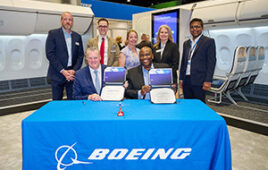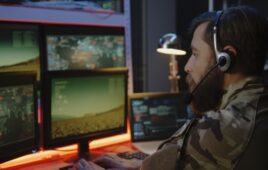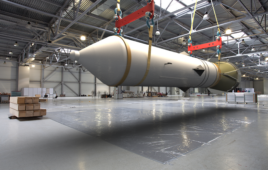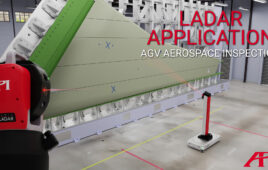An infantry unit goes into an area recently held by insurgents and finds evidence of a biological agent laboratory. Chemical biological experts arrive on the scene in protective suits and determine that they were weaponizing ricin. The warfighters in the unit need to know if they have been exposed, and fast.
The U.S. Army Edgewood Chemical Biological Center’s newly developed biological self-test kit can quickly get that answer and automatically send it in to the warfighter and his commander.
Known as SmartCAR, the device uses a colorimetric assay, much like a home pregnancy test strip, to identify the presence of a pathogen of concern such as ricin, anthrax or plague.
The warfighter or a field medic can take a saliva or stool sample, place it in a small vial containing a reagent that will bind the pathogen of concern, then place a drop of the solution on the strip. The strip is placed inside the handheld SmartCAR which then reads whether there is one line on the strip, meaning no exposure, or two lines on the strip — bad news.
The SmartCAR then transmits the results over Nett Warrior, a fielded integrated dismounted situational awareness system that displays tactical data on a smartphone. Information passes through Nett Warrior and up the chain of command.
If the test is positive, the warfighter and field medic know to immediately begin treatment, and the information is automatically entered into the warfighter’s medical record. The commander immediately knows about this individual warfighter, and if more are exposed, knows how many and where they are. This provides the commander with vital situational awareness to cordon off the area and notify the chain of command.
“Although much of the technology in SmartCAR is commercial off-the-shelf, it is a real innovation because it is a handheld field-ready device that not only determines exposure, but provides its own data management and distribution,” said Dr. Patricia Buckley, an ECBC research scientist on the SmartCAR development team.
SmartCAR is only limited by the strip assays available. It can also capture data from environmental sampling for field reconnaissance. An advance chemical biological team can take swab samples of suspicious surfaces and analyze them. By adding a device known as an impinger, an instrument for collecting samples of suspended particles by forcing them into a liquid stream, the team can also analyze air samples. This provides vital information to commanders who must decide whether or not to send units into suspect areas.
SmartCAR has important civilian applications, too. It can be brought to austere and forbidding environments to test drinking wells for water quality. A test strip that identifies the presence of Ebola could be used by medical personnel sent to control an outbreak. Its data management and distribution capabilities make it ideal for humanitarian relief mission personnel to establish restricted areas and determine resource needs.
ECBC developed SmartCAR for the U.S. Army Telemedicine and Advanced Technology Research Center, known as TATRC. TATRC seeks to automate information technology for medics and sought out ECBC to develop a prototype for laboratory and field testing. ECBC’s Advanced Design and Manufacturing team used its rapid development process to manufacture the housing and contents plus the software that identifies and communicates the presence of one line or two lines on the test strip.
Buckley and her fellow research scientists performed the laboratory testing to confirm SmartCAR could accurately identify each of the biological agent test strips specific to different pathogens. The team showcased the SmartCAR at a major Army medical conference where ground medics from several different units field tested the SmartCAR under realistic conditions and provided feedback for modifications.
TATRC took delivery of the prototype in June 2014 and is now demonstrating its capabilities to other military organizations to determine their interest in adopting it. Buckley and her team have since been increasing the variety of pathogen-specific immunoassay strips that the SmartCAR can read.
“It is exciting to be able to work on something that will actually go out into the field and help Soldiers safely accomplish their mission,” said Buckley. “With more time and funding, SmartCAR will be used in more and more settings, such as relief missions and even hospitals.”
Buckley hopes to ultimately combine the biological sensor capabilities of SmartCAR with another advanced ECBC technology, the VOCkit — a handheld, field-ready chemical agent detector which also uses colorimetric assay technology. However, the VOCkit does not analyze the data itself as does SmartCAR. Instead, it automatically sends the data to a software system that uses an algorithm to compare the unknown compound to a library of known compounds.
“A combined chemical biological detection device that small, that automated, and that wide-ranging could put an incredible amount of chemical biological data literally in the palm of your hand,” said Buckley. “The applications for military and civilian organizations safeguarding the public would be nearly limitless.”
Filed Under: Aerospace + defense




